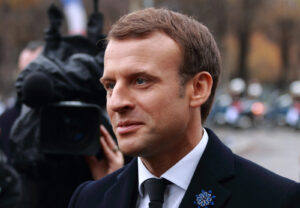France will elect a new president in April 2022, with President Macron seeking reelection. His opponents have insisted that the failure of the young president’s efforts to achieve a de-escalation in the Ukrainian crisis showed his incompetence and naivety. Their efforts to discredit Macron have largely failed.
President Macron was expected to face a tough reelection challenge this April. Throughout his presidency, Macron has faced many criticisms and challenges. His leadership has been lambasted during the COVID-19 epidemic, and his diplomatic efforts to avoid a war in Russia have not been successful. Until recently, the two candidates from the extreme-right, Marine Le Pen and Eric Zemmour were polling over 32%, which would have meant a risky second round for the young president who was polling at 24%.
The challenge to his reelection is unlikely to be successful. The most recent poll, published 48 hours after he announced on March 3 that he is seeking reelection, shows that his lead has increased, with more than 30% of the French people ready to vote for him in the first round, when all the other candidates are now under 15%.
The war in Ukraine has been the key catalyst for Macron’s popularity. From the beginning of the French Presidency of the European Union on January 1 to the beginning of the invasion on February 24, Macron has tried everything to find a way out of the crisis. Nevertheless, he has been under attack from all his opponents for the election. Le Pen’s spokesman called his actions “a political show that the President of the Republic loves.” The other extreme-right candidate, Zemmour, insisted that “his approach is doomed to failure,” because “we are seen by the Russians as the little telegraphers of Washington.” Melenchon, the primary candidate on the left, declared that Emmanuel Macron suffers from a problem of “credibility,” especially when Macron says that “we were going to defend the physical integrity of Ukraine,” which “the Russians know very well that we are incapable of.” Valerie Pécresse stated that Macron “has been taken for a ride” by his Russian counterpart.
But his opponents have failed. The French press has not forgotten to stress that Le Pen (extreme-right and second in the polls) has always been close to Putin and that her previous campaign was financed by a loan from a Russian bank, the First Czech-Russian Bank (FCBR). Beyond that, Le Pen has always been opposed to NATO. Eric Zemmour (extreme-right, third) and Jean-Luc Mélenchon (left, fourth) supported Putin’s demands concerning Ukraine and denied that Russia would ever attack. All of them condemned the invasion, but French people who are very supportive of Ukraine now view these candidates differently.
Even Valérie Pécresse, who cannot be seen as a fan of Putin’s Russia, has been embarrassed that her predecessor as a presidential candidate, former Prime Minister Francois Fillon, is known to have close ties with Vladimir Putin. Fillon was also a board member of Russian state-controlled oil company Zarubezhneft and petrochemical company Sibur. Fillon finally resigned, but it prompted Pécresse to be very mild in her critiques against Macron, and many believe that she lacks the experience to deal with an international crisis.
Emmanuel Macron is still developing diplomatic efforts facilitated by his friendship with Ukraine’s President Volodymyr Zelenskyy and his capacity to maintain a dialogue with Vladimir Putin. Today, he is in the position to win the presidential election easily and lead France for the next five years.




